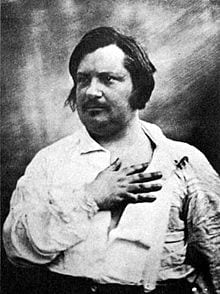Favourite writer: Honoré de Balzac
Favourite writer: Honoré de Balzac
Favourite writer: Honoré de Balzac
-
Hannah
-
Hannah
Although I spoke English at home with my parents, I was given a French education. I had a French/Italian governess, I went to a French convent school and I graduated from university with a BA in French Language and Literature. I think that the way I write has been much influenced by the very flowery use of words in French prose. I have spent many hours lost in a thesaurus, fascinated by the different nuances of words, and it is with great joy that I try to choose the right word to convey to the reader the description of a place, a scene and the emotions of my characters.
One of the classic French writers whose works have had a deep effect on me is Honoré de Balzac. Balzac (1799–1850), a novelist and playwright, was regarded as the founder of realism in the nineteenth century because of his ability to observe and create multifaceted characters, situating them in surroundings that were so thoroughly described that every minute detail counted. He is most remembered for La Comédie Humaine, which comprises a series of short stories and novels that depict life in France at the time.
What I find fascinating about Balzac and his works is his commitment to every single detail. Take this sentence, for example – consider the careful thought that has gone into every word choice and placement:
‘The more he saw, the more he doubted. He watched men narrowly, and saw how, beneath the surface, courage was often rashness; and prudence, cowardice; generosity, a clever piece of calculation; justice, a wrong; delicacy, pusillanimity; honesty, a modus vivendi; and by some strange dispensation of fate, he must see that those who at heart were really honest, scrupulous, just, generous, prudent or brave were held cheaply by their fellow-men.’
Balzac worked unbelievably hard, during the night often and for fifteen hours or more. He drove his publishers mad with his obsessive revision, over and over, of text. And he took setting the scene so far as to write twenty pages of description of some locations – having travelled to the places and studied them carefully. Such dedication!
He is widely acclaimed as being one of the great French writers. At his funeral (which was attended by all the notable writers of the time), pallbearer Victor Hugo said, ‘We have a people in black because of the death of the man of talent; a nation in mourning for a man of genius.’ The great sculptor Auguste Rodin immortalised the writer in a monument which stands in Paris. Balzac’s legacy is far-reaching; his works have inspired many celebrated writers since, from Proust and Dickens to Poe and Dostoyevsky, Flaubert and Henry James to Faulkner and Kerouac.
I have read all of the Balzac’s books more than once, and every time I have discovered some new aspect which I had not been aware of before. Fascinating! When I write, I am inspired by Balzac and his careful, measured, dedicated approach to writing:
‘The man who can but sketch his purpose beforehand in words is regarded as a wonder, and every artist and writer possesses that faculty. But gestation, fruition, the laborious rearing of the offspring, putting it to bed every night full fed with milk, embracing it anew every morning with the inexhaustible affection of a mother’s heart, licking it clean, dressing it a hundred times in the richest garb only to be instantly destroyed; then never to be cast down at the convulsions of this headlong life till the living masterpiece is perfected which in sculpture speaks to every eye, in literature to every intellect, in painting to every memory, in music to every heart! – this is the task of execution. The hand must be ready at every moment to work in obedience to the mind.’
